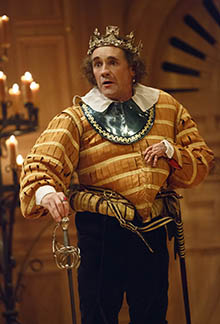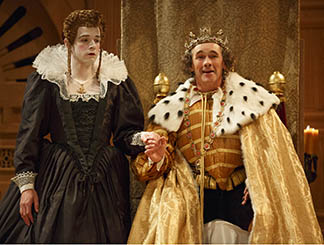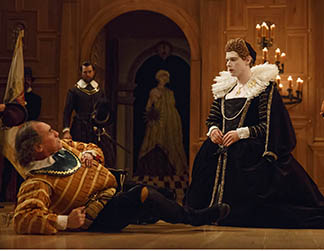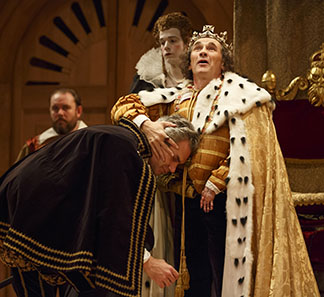
Mark Rylance‘s portrayal of the malevolent Richard III is a complex and original psychological study. Let‘s take this beyond what was expected of power seekers in Elizabethan times, that they might be rapacious and without morals. (Plus §a change, as they say.) Shakespeare doesn‘t just assume the pathology of 15th-century English politics, but wonders what is wrong with a man who plots to kill everyone, including family members, that stand between him and the throne.
And as he is a master actor, Rylance‘s way into Richard‘s psyche is achieved by making him a guy who speaks in normal tones, whose every grimace reflects utter realism. In this version, Richard is not hunch-backed but has a shrunken arm, which he hides in his doublet, concealing the physical flaw that represents his badly camouflaged moral flaw.
Rylance arrives on stage, limping, with a flower. He notes that since he can‘t be a lover, he will be a villain, and his goal is to be king. Everything follows from that, which is grist for psychoanalyists. His brother King Edward (a very good Colin Hurley) is frail, and his mantle is up for grabs.
Richard/Rylance, with a funny laugh and high-pitched wailing, pulls out his shrunken left arm and, one by one, orders the murders of those who stand in his way.
Richard‘s first victim is his own brother, the Duke of Clarence (Liam Brennan). Richard invents lies that lead the King to imprison Clarence and order his death. He is quite open to himself about his own immoral character.
“To set my brother Clarence and the king
In deadly hate, the one against the other:
And if King Edward be as true and just,
As I am subtle, false and treacherous,
This day should Clarence closely be mew’d up.”
Edward, overcome by remorse at the death of Clarence, dies – one of the few natural deaths.

Attempting to consolidate his power, Richard manipulates Anne Neville (Joseph Timms), widow of Edward, Prince of Wales, whom Richard had murdered, to take his marriage ring. (Like the other men playing women in this production Timms is excellent. He could deceive anyone about his gender.) Richard gushes phony tears and expresses triumph to the audience through the fourth wall, declaiming:
I’ll marry Warwick‘s youngest daughter.
What, though I kill’d her husband and her father?
And Richard plots the short future of his wife:
Richard [Aside]: “So wise so young, they say, do never live long.”
Prince Edward: “What say you uncle?”
Richard: “I say, without characters, fame lives long.”

There‘s a lot of camping or almost camping. When an Irish major arrives with the head of Hastings, another enemy Richard has ordered killed, he holds it and shed crocodile tears. When he is told he will be crowned king, he reacts with feigned surprise like any good phony politician: “Oh! Oh! Oh!” The audience laughs.
Rylance is also very good at showing Richard‘s insecurity; he giggles, he gnaws at his fingers. Anne by then is like a zombie and she soon dies. Aiming at a next in line, he wants to marry his brother‘s daughter, Elizabeth. But she will not marry him. And his brother‘s widow, Queen Elizabeth (the excellent Samuel Barnett), helps stall him off. Another tough woman, Richard‘s noble mother, the Duchess of York (Kurt Egyiawan), displays cool passion and unyielding determination against her son‘s infamous intent. Some good women here.
Toward the end, when it seems that his plans will be upended, Richard/Rylance declares, “Women! Ah Ah Ah!” He seems to be losing it. Rylance does a little jig. His voice is fearful and trembling. Richard talks to himself, declaring, “I hate myself.” He knows he is guilty. “There is no creature loves me.” He displays his shrunken left arm as if it were a talisman of his crimes.

Richard turns friends into enemies, failing to pay off the Duke of Buckingham (Angus Wright) for his past services after the Duke doesn‘t want to murder Edward‘s young sons. So Buckingham joins other enemies who will return in battle. Then, Richard is thrown from his horse, leading to the famous line, A horse, a horse, my kingdom for a horse! Except you know that this is also a desperate lie, another con. It ends the only way it could. Richmond (Egyiawan), a leader of the opposition, kills Richard in a duel. He will marry the princess, Elizabeth.
What Rylance brings to this production is the subtle expression of evil that does not require loud malicious tones, but is achieved quietly, subtly, even sotto voce. It‘s a memorable performance. Director Tim Carroll keeps the mood tense and real, so that it feels like a thriller.
And he preserves the mood of the original with a set that aims to conjure up the Globe Theater. The stage features sconces with tapers on chandeliers that descend from above, trumpets and trombones played from a high walkway, and a double row of wood benches holding audience members at the sides. The design is by Jenny Tiramani and music by Claire van Kampen. It is unforgettable theater.
“Richard III.” Written by William Shakespeare; directed by Tim Carroll. Belasco Theatre, 111 W. 44th St., New York City. 212-239-6200 or 800-447-7400. Opened Nov 10, 2013; closes Feb 15, 2014. 12/29/13. Review on New York Theatre Wire.

